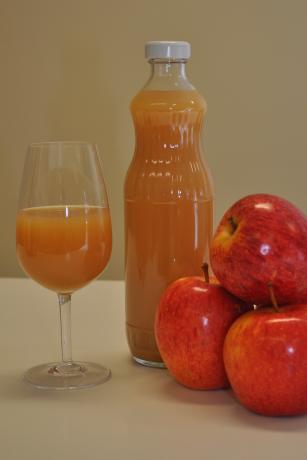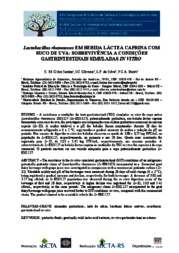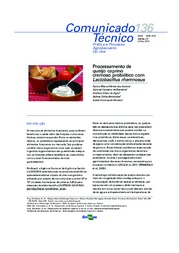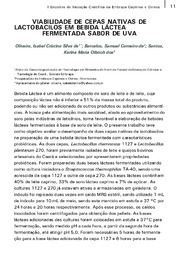Researchers of Embrapa Food Technology, in the state of Rio de Janeiro, and of Embrapa Grape and Wine, in the state of Rio Grande do Sul, developed an apple juice with live lactobacilli that does not need to be refrigerated. Until now, in Brazil, only dairy products contained these microorganisms that are beneficial to the intestinal flora. The new product is suitable for consumers who are allergic to milk and lactose intolerant, as well as for vegans. Prepared with whole fruit juice and encapsulated probiotics, the new drink has a double functionality: the apple juice is considered beneficial to human health due to its bioactive compounds and the probiotics aid in the balance of intestinal microbiota and help to prevent several diseases. Right now, Embrapa is looking for a research partner to finish developing the technology and then to launch the product in the market. Currently, the drinks with probiotics available in the Brazilian market are dairy, fermented, and need to be refrigerated. “The aim was to develop a dairy-free and non-fermented drink with probiotics that could be kept at room temperature. We tested thirteen different formulations, using juices from two apple varieties (Gala and Fuji) and two processing technologies, until we reached the ideal one”, says Janine Passos, researcher of the microbiology laboratory of Embrapa Food Technology and leader of the research. The final juice formulation was chosen due to its properties, prolonged shelf life, and the results of the sensory tests to determine consumer preferences. The base of the formulation is the whole juice from the Fuji apple with encapsulated bacteria of the genus Lactobacillus, subjected to pasteurization and the hot-filling technique. The product also stands out because of its 12-month shelf life and storage at room temperature. The drinks currently available in the market need to be refrigerated up to 10 °C and have a useful shelf life of only 35 days. Good consumer acceptance Three sensorial analyses were carried to evaluate the acceptance of the apple juice with probiotics, using a panel formed by the employees of Embrapa Food Technology, followed by a final test with 114 consumers at a grocery store chain in the city of Rio de Janeiro. The formulations that were best evaluated by the internal panel were offered to the outside consumers. Among them, 61% already consumed probiotic food products. The obtained results showed that the presence of probiotic bacteria did not alter the flavor of the whole apple juice and also added properties that are beneficial to human health. The product was very well accepted. “On a scale of 1 to 9, the average score was 8.05, which represents the concept ‘very good’. And the characteristics highlighted by the consumers were ‘apple flavor’ and ‘ideal sweetness”, points out Daniela Freitas, researcher of the laboratory for sensorial and instrumental analyses of the same unit of Embrapa that performed the sensorial analysis. Moreover, about 95% of the consumers agreed that they were tasting a drink that was healthy and could help prevent diseases due to its probiotic properties. “Our studies, however, have shown that consumer purchasing decision continues to depend more on palatability than on health-related aspects. In other words, the consumer still prefers food products that taste better to those that are healthier. Therefore, the ideal is to unite both characteristics, as was done with this product”, weighed Freitas. Microencapsulation of probiotics The process of microencapsulation by ionic gelling was used to maintain the viability of the probiotics after pasteurization and during juice shelf life. The microorganisms were encapsulated in microgels composed of alginate, gelatin, and oligofructose, to be protected from adverse external conditions. Oligofructose is known for its prebiotic properties, contributing to maintain the viability of the probiotics. The microgels were developed at the food processing pilot plant of Embrapa Food Technology by the researcher Renata Tonon in partnership with the teacher Ana Carla Sato and the master’s student Karen Silva, both from the graduate program in Food Engineering of Universidade Estadual de Campinas (Unicamp), who carried out a study to define the best composition for the gels. “Microencapsulation by ionic gelling is a simple process, but it is still little used in the Brazilian food industry. Its adoption is interesting when adding compounds that require a controlled release or that need to be protected during processing and storage, as is the case of this apple juice. For probiotics, it is also important to guarantee that the microorganisms will survive while passing through the gastrointestinal tract”, states Tonon. The assays on the bioaccessibility of the apple juice with probiotics confirmed this protection. “The results obtained in the simulation of in vitro digestion show that, in the evaluated conditions, compared with the probiotics that were not encapsulated, the encapsulated microorganisms had a better survival rate while passing through the gastrointestinal tract and were only released in the intestine, where they should have probiotic activity”, reports the researcher Flávia Gomes of the bioacessability laboratory of Embrapa Food Technology, responsible for carrying out the study. The next phase of the research are clinical tests to confirm the benefits to human health of consuming apple juice with probiotics. To be authorized by the Brazilian Health Regulatory Agency (Anvisa),), both the commercialization and the inclusion of the term “functional food” on the label of the product should be supported by scientific evidence. The clinical tests necessary to prove the probiotic effect of the apple juice will be performed by a team of the hospital Hospital Universitário Pedro Ernesto of Universidade Estadual do Rio de Janeiro (UERJ), in the following months. Greater value for whole apple juice In several countries, including Brazil, juice extraction is an alternative use for fruit discarded to be consumed fresh. The development of new products adds value to the production chain, increasing agribusiness productivity. “Apple juice with probiotics helps to diversify the offer of functional foods, allowing the industries that manufacture pasteurized fruit juice to enter the market of products with probiotics”, highlights Esdras Sundfeld, deputy head of Research and Development of Embrapa Food Technology. The apple juice used to develop this new product was produced at the enological innovation laboratory of Embrapa Grape & Wine, located in Bento Gonçalves, in the state of Rio Grande do Sul, using apples collected at the experimental station of temperate climate fruits in Vacaria, in the same state. To manufacture the drink, fruit with little damage and few injuries, classified in category 3, but that still maintained all their nutrients, were used. No sugar or preservatives were added. “Besides whole juices with or without the addition of probiotics, we are also developing new apple-based products, such as cider and brandy”, shares César Luis Girardi, researcher of Embrapa Grape & Wine and member of the research team. According to him, by offering the farmers a product with a high aggregated value, this research contributes to increasing competitiveness and economic, social, and environmental sustainability in the apple production chain. “This is a demand that has been discussed and supported by two Brazilian apple growers associations, Associação Brasileira de Produtores de Maçã (ABPM) and Associação Gaúcha de Produtores de Maçã (Agapomi)”, adds Girardi. According to the annual apple crop statistics, Anuário Brasileiro da Maçã, published by ABPM, Brazilian apple production reached 1.1 million tons in 2018, and 90% of this production is concentrated in the states of Rio Grande do Sul and Santa Catarina, focusing on two varieties: Gala and Fuji. Brazil also exports the fruit in natura. Translation: Micla Cardoso
Photo: Janine Passos
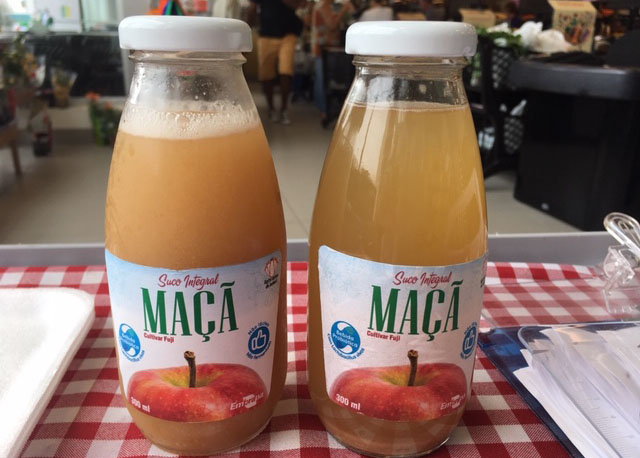
The product does not require refrigeration to keep lactobacilli alive
Researchers of Embrapa Food Technology, in the state of Rio de Janeiro, and of Embrapa Grape and Wine, in the state of Rio Grande do Sul, developed an apple juice with live lactobacilli that does not need to be refrigerated. Until now, in Brazil, only dairy products contained these microorganisms that are beneficial to the intestinal flora. The new product is suitable for consumers who are allergic to milk and lactose intolerant, as well as for vegans.
Prepared with whole fruit juice and encapsulated probiotics, the new drink has a double functionality: the apple juice is considered beneficial to human health due to its bioactive compounds and the probiotics aid in the balance of intestinal microbiota and help to prevent several diseases. Right now, Embrapa is looking for a research partner to finish developing the technology and then to launch the product in the market.
Currently, the drinks with probiotics available in the Brazilian market are dairy, fermented, and need to be refrigerated. “The aim was to develop a dairy-free and non-fermented drink with probiotics that could be kept at room temperature. We tested thirteen different formulations, using juices from two apple varieties (Gala and Fuji) and two processing technologies, until we reached the ideal one”, says Janine Passos, researcher of the microbiology laboratory of Embrapa Food Technology and leader of the research.
The final juice formulation was chosen due to its properties, prolonged shelf life, and the results of the sensory tests to determine consumer preferences. The base of the formulation is the whole juice from the Fuji apple with encapsulated bacteria of the genus Lactobacillus, subjected to pasteurization and the hot-filling technique.
The product also stands out because of its 12-month shelf life and storage at room temperature. The drinks currently available in the market need to be refrigerated up to 10 °C and have a useful shelf life of only 35 days.
Good consumer acceptance
Three sensorial analyses were carried to evaluate the acceptance of the apple juice with probiotics, using a panel formed by the employees of Embrapa Food Technology, followed by a final test with 114 consumers at a grocery store chain in the city of Rio de Janeiro. The formulations that were best evaluated by the internal panel were offered to the outside consumers. Among them, 61% already consumed probiotic food products.
The obtained results showed that the presence of probiotic bacteria did not alter the flavor of the whole apple juice and also added properties that are beneficial to human health. The product was very well accepted. “On a scale of 1 to 9, the average score was 8.05, which represents the concept ‘very good’. And the characteristics highlighted by the consumers were ‘apple flavor’ and ‘ideal sweetness”, points out Daniela Freitas, researcher of the laboratory for sensorial and instrumental analyses of the same unit of Embrapa that performed the sensorial analysis.
Moreover, about 95% of the consumers agreed that they were tasting a drink that was healthy and could help prevent diseases due to its probiotic properties. “Our studies, however, have shown that consumer purchasing decision continues to depend more on palatability than on health-related aspects. In other words, the consumer still prefers food products that taste better to those that are healthier. Therefore, the ideal is to unite both characteristics, as was done with this product”, weighed Freitas.
Microencapsulation of probiotics
The process of microencapsulation by ionic gelling was used to maintain the viability of the probiotics after pasteurization and during juice shelf life. The microorganisms were encapsulated in microgels composed of alginate, gelatin, and oligofructose, to be protected from adverse external conditions. Oligofructose is known for its prebiotic properties, contributing to maintain the viability of the probiotics.
The microgels were developed at the food processing pilot plant of Embrapa Food Technology by the researcher Renata Tonon in partnership with the teacher Ana Carla Sato and the master’s student Karen Silva, both from the graduate program in Food Engineering of Universidade Estadual de Campinas (Unicamp), who carried out a study to define the best composition for the gels. “Microencapsulation by ionic gelling is a simple process, but it is still little used in the Brazilian food industry. Its adoption is interesting when adding compounds that require a controlled release or that need to be protected during processing and storage, as is the case of this apple juice. For probiotics, it is also important to guarantee that the microorganisms will survive while passing through the gastrointestinal tract”, states Tonon.
The assays on the bioaccessibility of the apple juice with probiotics confirmed this protection. “The results obtained in the simulation of in vitro digestion show that, in the evaluated conditions, compared with the probiotics that were not encapsulated, the encapsulated microorganisms had a better survival rate while passing through the gastrointestinal tract and were only released in the intestine, where they should have probiotic activity”, reports the researcher Flávia Gomes of the bioacessability laboratory of Embrapa Food Technology, responsible for carrying out the study.
The next phase of the research are clinical tests to confirm the benefits to human health of consuming apple juice with probiotics. To be authorized by the Brazilian Health Regulatory Agency (Anvisa),), both the commercialization and the inclusion of the term “functional food” on the label of the product should be supported by scientific evidence. The clinical tests necessary to prove the probiotic effect of the apple juice will be performed by a team of the hospital Hospital Universitário Pedro Ernesto of Universidade Estadual do Rio de Janeiro (UERJ), in the following months.
Greater value for whole apple juice In several countries, including Brazil, juice extraction is an alternative use for fruit discarded to be consumed fresh. The development of new products adds value to the production chain, increasing agribusiness productivity. “Apple juice with probiotics helps to diversify the offer of functional foods, allowing the industries that manufacture pasteurized fruit juice to enter the market of products with probiotics”, highlights Esdras Sundfeld, deputy head of Research and Development of Embrapa Food Technology. The apple juice used to develop this new product was produced at the enological innovation laboratory of Embrapa Grape & Wine, located in Bento Gonçalves, in the state of Rio Grande do Sul, using apples collected at the experimental station of temperate climate fruits in Vacaria, in the same state. To manufacture the drink, fruit with little damage and few injuries, classified in category 3, but that still maintained all their nutrients, were used. No sugar or preservatives were added.
“Besides whole juices with or without the addition of probiotics, we are also developing new apple-based products, such as cider and brandy”, shares César Luis Girardi, researcher of Embrapa Grape & Wine and member of the research team. According to him, by offering the farmers a product with a high aggregated value, this research contributes to increasing competitiveness and economic, social, and environmental sustainability in the apple production chain. “This is a demand that has been discussed and supported by two Brazilian apple growers associations, Associação Brasileira de Produtores de Maçã (ABPM) and Associação Gaúcha de Produtores de Maçã (Agapomi)”, adds Girardi.
According to the annual apple crop statistics, Anuário Brasileiro da Maçã, published by ABPM, Brazilian apple production reached 1.1 million tons in 2018, and 90% of this production is concentrated in the states of Rio Grande do Sul and Santa Catarina, focusing on two varieties: Gala and Fuji. Brazil also exports the fruit in natura. |
Translation: Micla Cardoso
Aline Bastos (MTb 31.779/RJ)
Embrapa Food Technology
Press inquiries
agroindustria-de-alimentos.imprensa@embrapa.br
Phone number: +55 21 3988-9739
Further information on the topic
Citizen Attention Service (SAC)
www.embrapa.br/contact-us/sac/


